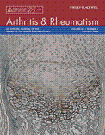Transfer of the shared epitope through microchimerism in women with rheumatoid arthritis
Abstract
Objective
Rheumatoid arthritis (RA) is an autoimmune disease that affects mostly women and is associated with HLA–DRB1 genes having in common a shared epitope sequence. In parallel, cells and/or DNA originating from pregnancy (microchimerism) persist for decades and could contribute to autoimmunity. The aim of this study was to examine whether microchimerism may be a source of the shared epitope among women with RA.
Methods
Women with RA and healthy women who lacked RA-associated genes such as HLA–DRB1*01 (n = 33 and n = 46, respectively) and/or HLA–DRB1*04 (n = 48 and n = 64, respectively), were tested for DRB1*01 or DRB1*04 microchimerism by HLA-specific quantitative polymerase chain reaction assays. As controls, alleles not associated with RA (DQB1*02 and DRB1*15/16) were also analyzed.
Results
Compared with healthy women, women (42% with RA had a higher frequency and higher levels of DRB1*04 microchimerism versus 8%; P = 0.00002) as well as DRB1*01 microchimerism (30% versus 4%; P = 0.0015). Moreover, no difference in microchimerism was observed for alleles not associated with RA.
Conclusion
Women with RA had microchimerism with RA-associated HLA alleles, but not with non–RA-associated HLA alleles, more often and at higher levels compared with healthy women. These observations are the first to indicate that microchimerism can contribute to the risk of an autoimmune disease by providing HLA susceptibility alleles.




